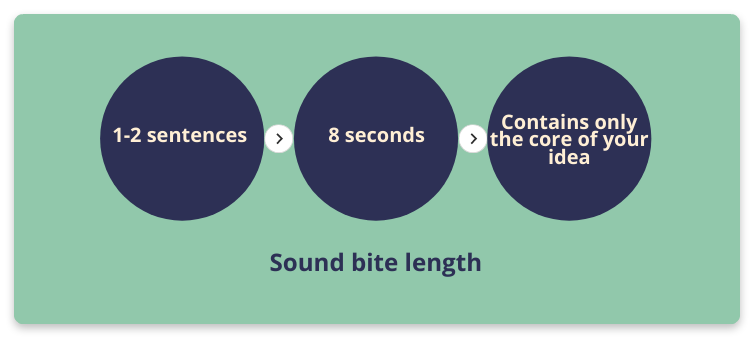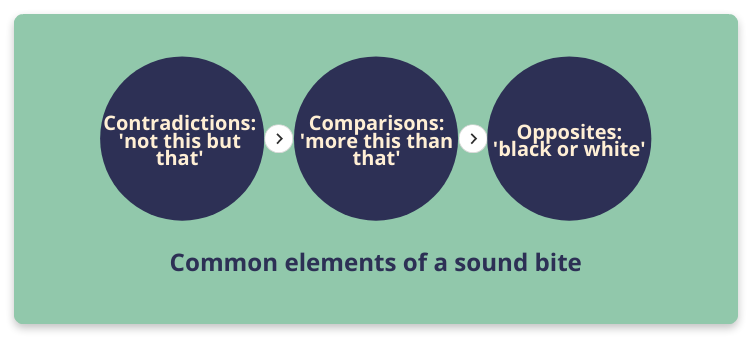Sound bite
If you are in marketing and sales, you need to master the ability to create your sound bites to position your business and brand to the public. And to get the message across, there are a few tips for crafting descriptive and well-formed sound bites.
What is a sound bite?
A sound bite is a short, catchy piece of video, audio, or speech chosen to give the essence of what you are saying and arouse interest in the full-length source. It’s widely used in journalism, politics, and marketing to define headlines, which eventually helps people know about a product, event, or even a period in history.
Sound bite examples
| Product/Business | Sound bite |
|---|---|
| Nike | Just do it! |
| McDonald’s | I’m loving it |
| Don’t be evil | |
| Apple | Think different |
| Microsoft | Be what’s next |
Where does a sound bite definition come from?
The term “sound bite” originated in the 1970s by the American media and has been highly used by politicians to sum up their positions ever since. Daniel Schorr, news analyst for National Public Radio and Washington correspondent, traced the root of the term to the 1960s. When a producer saw the excerpt he wanted, he told the film editor, “Take that bite.”
Things to consider:
In today’s media, sound bites substitute slogans politicians used before, which now are out-of-date. One of the most famous examples of sound bites is President John F. Kennedy’s words: “Ask not what your country can do for you – ask what you can do for your country.” This quote remains memorable even after more than 50 years.
Compared to the 1960s, when a standard sound bite lasted 40 seconds, it is shorter now. These days, an average sound bite has been reduced to under 8 seconds.
Sound bite in marketing
In a rapidly changing market, a sound bite is aimed at illustrating a brand message, making an impression on customers, and resulting in higher revenue and sales. Some people treat sound bites as an elevator speech. Whatever the perks are, a sales rep should say it within the time it takes to ride the elevator. Other businesspeople light a match and finish their sound bites till it burns out.
Creating a unique and catchy sound bite to distinguish it from others is not an easy task. For this, marketers have to search for repeatable phrases, keep the message clear in mass-media, and stick to a limited time. In the digital age, only the best sound bite wins.

How to create successful sound bites
- Practice
- Know your target audience
- Make it short
- Include stylistic devices to attract attention
- Make contrast
- Use the rule of three
- Be charismatic
Practice
Preparation and practice are critical components in creating a sound bite. Write your script on how you would naturally speak. Consider every bit of your sound bite and practice until you are comfortable with that and sound natural.
Know your target audience
Your target audience is potential customers who are not interested in you; they are interested in how your product or service can help them. Convince your clients why they should buy your solution, show them what they need based on their pain points, give them what they want.
Make it short
Just give the main idea of your sales message. Make it in one or two sentences. The shorter and more concise your sound bite is, the easier it will be to remember. Mark Twain endorsed the idea of sound bite’s conciseness, defining it as “a minimum of sound to a maximum of sense.”

Include stylistic devices to attract attention
Metaphors and alliteration play a prominent role in the emotive aspect and have a powerful effect on the customer’s thinking. Rhyme, repetition, and rhythm make sound bites easier to remember. Often they surprise customers and attract their attention.
Make contrast
Let’s recollect Neil Armstrong’s famous statement when he stepped on the moon: “One small step for a man, one giant leap for mankind.” There is a contrast between the two points, and it creates a situation that’s easy to memorize.
As Dr. Atkinson, the author of “Speech-Making and Presentations Made Easy,” points out, using contrasts can help you become a real winner and make your point bigger. After all, 33% of the applause a good speech gets is when contrast is used.

Use the rule of three
The rule of three is all about giving ideas in threes. The first piece creates pressure, the second enhances it, and the third relieves it. This is a proven method of better memorizing. A famous Mars advertisement “A Mars a day helps you work, rest, and play” is a good representation of the rule of three.
Be charismatic
We all know that it’s not just what you say that matters but also how you say it. You are a person worth listening to because you can help people get what they want and achieve their goals.
A sound bite is just a part of a conversation. Be flexible, have some small success stories (or anecdotes, statistics, and facts) up your sleeve just in case and tell the most appropriate to your customers. Be prepared for possible questions like “Do you offer a 30-day free trial?,” “Do you have a discount?,” “Can you show a demo?,” etc. Once you notice any buying signals, it’s time to close the deal.
Wrapping it up
Remember, your sound bites should communicate the core of your idea in smooth language. Don’t include irrelevant details and exceptions. Make it simple, no longer than 1-2 sentences.















